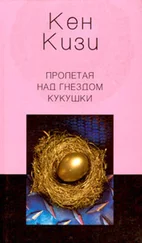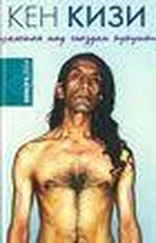| I hear him swallow and start again. "You were supposed to say, |
Слышу, сглатывает и пробует снова. - Полагалось ответить: |
| ' Here sir,' and I never c-c-could get it out." |
"Здесь, сэр", - а я ни за что н-не мог. |
| His voice gets dim; then the Big Nurse's voice comes cutting from the left. |
Г олос уходит, потом слева врезается голос старшей сестры: |
| "Can you recall, Billy, when you first had speech trouble? |
- Билли, вы можете вспомнить, когда у вас возникли затруднения с речью? |
| When did you first stutter, do you remember?" |
Когда вы начали заикаться, помните? |
| I can't tell is he laughing or what. |
Не пойму, смеется он или что. |
| "Fir-first stutter? |
- Н-начал заикаться? |
| First stutter? |
Начал? |
| The first word I said I st-stut-tered: m-m-m-m-mamma." |
Я начал заикаться с первого с-своего слова: м-м-м-мама. |
| Then the talking fades out altogether: I never knew that to happen before. |
Потом разговор заглох совсем; такого со мной еще не бывало. |
| Maybe Billy's hid himself in the fog too. |
Может, Билли тоже спрятался в тумане. |
| Maybe all the guys finally and forever crowded back into the fog. |
Может быть, все острые окончательно и навсегда провалились в туман. |
| A chair and me float past each other. |
Я и стул проплываем друг мимо друга. |
| It's the first thing I've seen. |
Это первый предмет, который я вижу. |
| It comes sifting out of the fog off to my right, and for a few seconds it's right beside my face, just out of my reach. |
Он выцеживается из тумана справа и на несколько секунд повисает прямо передо мной, чуть-чуть бы ближе, и рукой достал бы. |
| I been accustomed of late to just let things alone when they appear in the fog, sit still and not try to hang on. |
В последнее время я не связываюсь с вещами, которые появляются из тумана, сижу тихо и не цепляюсь за них. |
| But this time I'm scared, the way I used to be scared. |
Но сейчас я напуган так, как раньше бывал напуган. |
| I try with all I got to pull myself over to the chair and get hold of it, but there's nothing to brace against and all I can do is thrash the air, all I can do is watch the chair come clear, clearer than ever before to where I can even make out the fingerprint where a worker touched the varnish before it was dry, looming out for a few seconds, then fading on off again. |
Изо всех сил тянусь к стулу, хочу схватить его, но опоры нет, только бултыхаюсь в воздухе, только смотрю, а стул вырисовывается все яснее, яснее, чем всегда, так что различаю даже отпечаток пальца там, где рабочий прикоснулся к непросохшему лаку, - стул висит передо мной несколько секунд, потом скрывается. |
| I never seen it where things floated around this way. |
Никогда не видел, чтобы вещи плавали. |
| I never seen it this thick before, thick to where I can't get down to the floor and get on my feet if I wanted to and walk around. |
Никогда не видел такого густого, такого, что не могу опуститься на пол, встать на ноги и пойти. |
| That's why I'm so scared; I feel I'm going to float off someplace for good this time. |
Поэтому и напуган: чувствую, что на этот раз могу уплыть куда-то навсегда. |
| I see a Chronic float into sight a little below me. |
Из тумана, чуть ниже меня, выплывает хроник. |
| It's old Colonel Matterson, reading from the wrinkled scripture of that long yellow hand. |
Это старик полковник Маттерсон читает письмена морщин на длинной желтой ладони. |
| I look close at him because I figure it's the last time I'll ever see him. |
Смотрю на него внимательно, потому что вижу его, наверно, в последний раз. |
| His face is enormous, almost more than I can bear. |
Лицо огромное, невыносимо смотреть. |
| Every hair and wrinkle of him is big, as though I was looking at him with one of those microscopes. |
Каждый волос и морщина большие, будто гляжу на него в микроскоп. |
| I see him so clear I see his whole life. |
Вижу его так ясно, что вижу всю его жизнь. |
| The face is sixty years of southwest Army camps, rutted by iron-rimmed caisson wheels, worn to the bone by thousands of feet on two-day marches. |
На лице шестьдесят лет юго-западных военных лагерей, оно изрыто окованными сталью колесами зарядных ящиков, стерто до кости тысячами ног в двухдневных марш-бросках. |
| He holds out that long hand and brings it up in front of his eyes and squints into it, brings up his other hand and underlines the words with a finger wooden and varnished the color of a gunstock by nicotine. |
Он выпрямляет длинную ладонь, подносит к глазам, щурится и пальцем другой руки, мореным и лакированным, как приклад, от въевшегося никотина, подчеркивает на ней слова. |
| His voice as deep and slow and patient, and I see the words come out dark and heavy over his brittle lips when he reads. |
Голос у него низкий, медленный, терпеливый, и вижу, как выходят из его хрупких губ тяжелые и темные слова. |
| "No... The flag is... Ah-mer-ica. |
-Так... Флаг - это... А-а-мери-ка. |
| America is... the plum. |
Америка - это... Слива. |
| The peach. |
Персик. |
| The wah-ter-mel-on. |
Арбуз. |
| America is... the gumdrop. |
Америка - это... Леденец. |
| The pump-kin seed. |
Тыквенное семечко. |
| America is... tell-ah-vision." |
Америка - это телевизор. |
| It's true. |
Это правда. |
| It's all wrote down on that yellow hand. |
Все написано на желтой ладони. |
| I can read it along with him myself. |
Я читаю вместе с ним. |
| "Now... The cross is... Mex-i-co." He looks up to see if I'm paying attention, and when he sees I am he smiles at me and goes on. "Mexico is... the wal-nut. |
-Теперь... Крест - это... Мексика. - Поднимает глаза: слушаю ли я; увидел, что слушаю, улыбнулся и читает дальше: - Мексика - это грецкий орех. |
| The hazelnut. |
Фундук. |
| The ay-corn. |
Же-лудь. |
| Mexico is... the rain-bow. |
Мексика - это радуга. |
| The rain-bow is... wooden. |
Радуга... Деревянная. |
| Mexico is... woo-den." |
Мексика... Деревянная. |
| I can see what he's driving at. |
Я понимаю, к чему он клонит. |

![Агата Кристи - На краю [английский и русский параллельные тексты]](/books/32247/agata-kristi-na-krayu-anglijskij-i-russkij-paralle-thumb.webp)
![Сакс Ромер - Ведьмино отродье [английский и русский параллельные тексты]](/books/33237/saks-romer-vedmino-otrode-anglijskij-i-russkij-thumb.webp)
![Агата Кристи - Объявлено убийство [английский и русский параллельные тексты]](/books/33247/agata-kristi-obyavleno-ubijstvo-anglijskij-i-russ-thumb.webp)
![Фрэнсис Фицджеральд - По эту сторону рая [английский и русский параллельные тексты]](/books/34130/frensis-ficdzherald-po-etu-storonu-raya-anglijskij-thumb.webp)
![Мэри Райнхарт - Дверь [английский и русский параллельные тексты]](/books/34133/meri-rajnhart-dver-anglijskij-i-russkij-parallel-thumb.webp)
![Роберт Шекли - Компания «Необузданные таланты» [английский и русский параллельные тексты]](/books/34808/robert-shekli-kompaniya-neobuzdannye-talanty-angl-thumb.webp)

